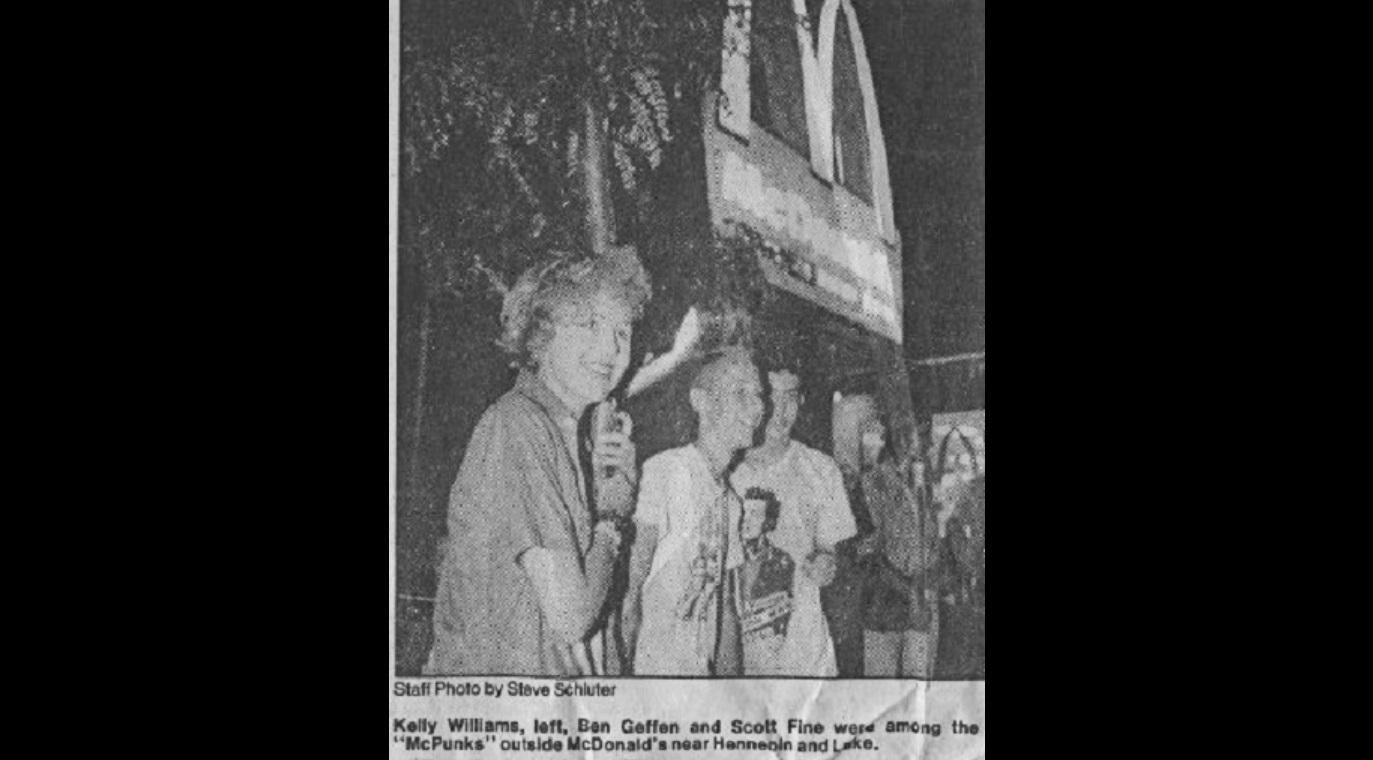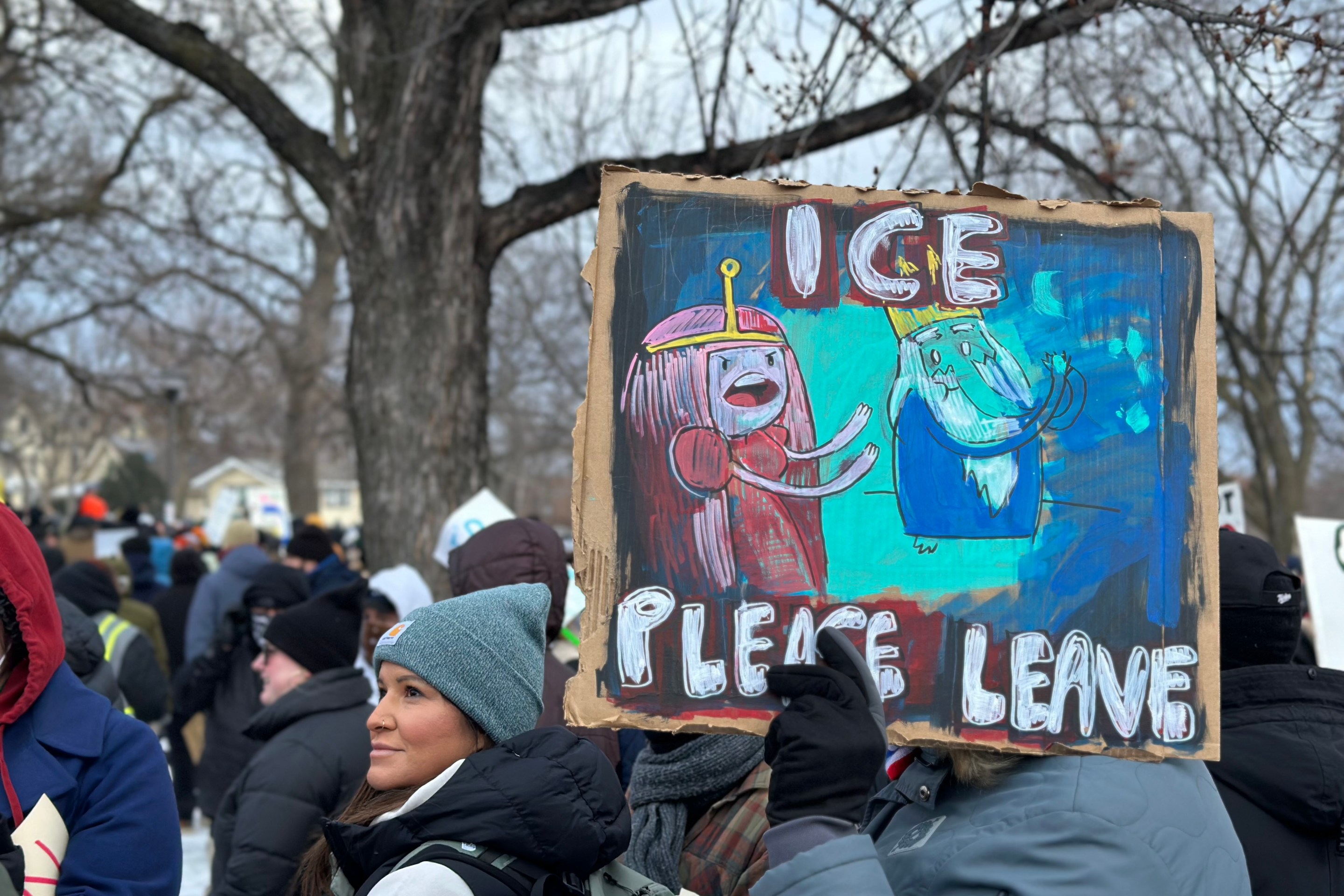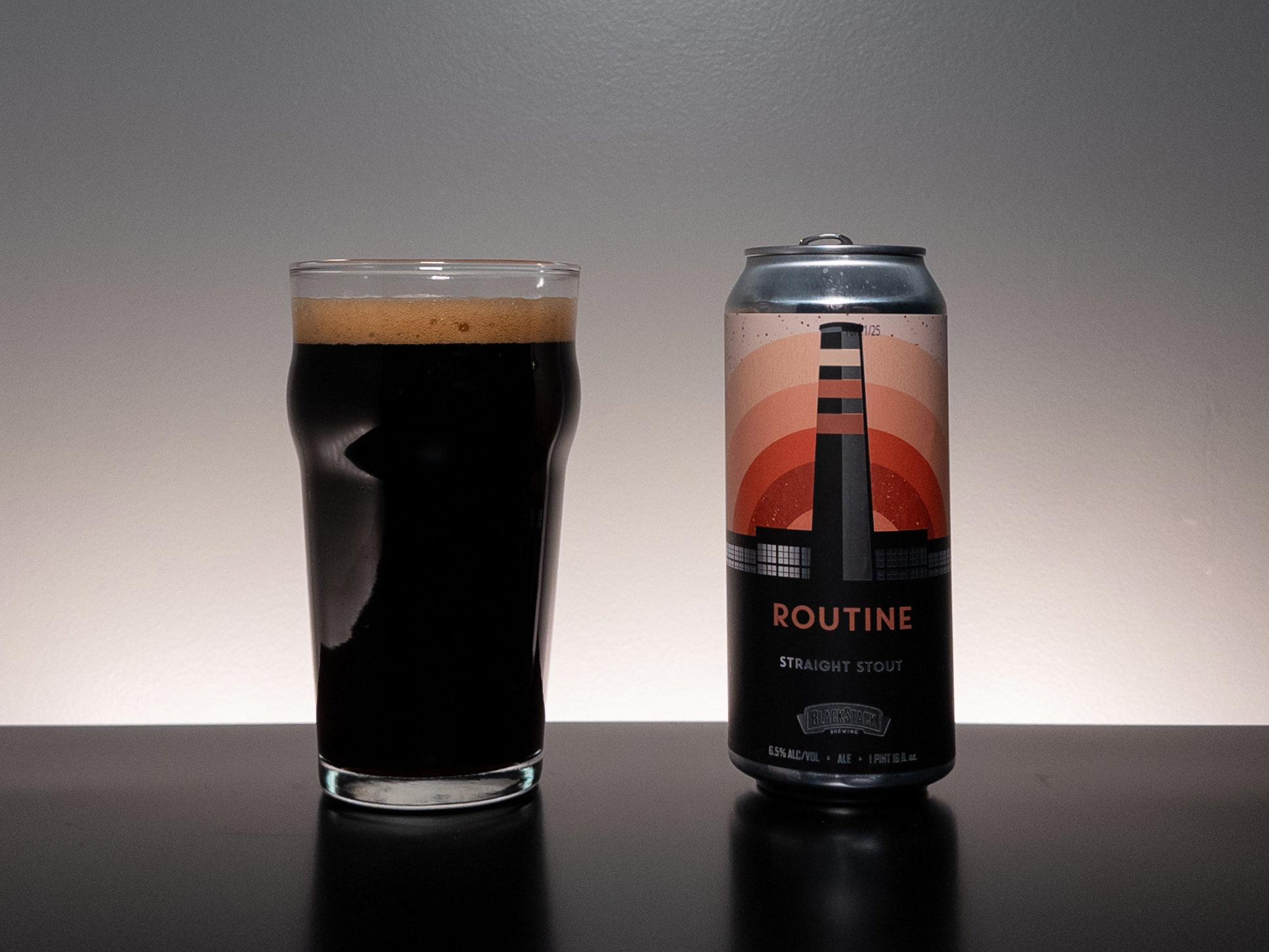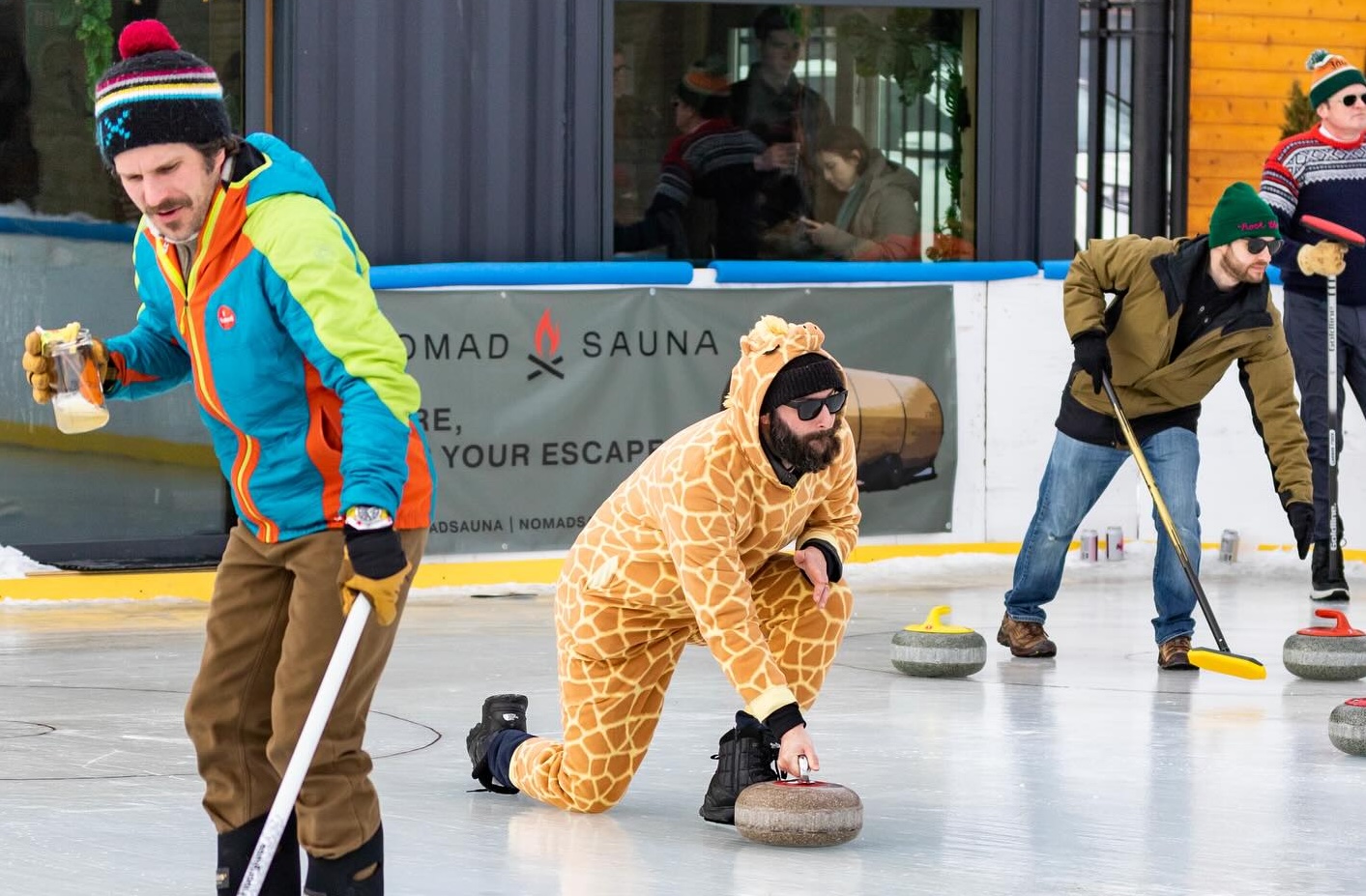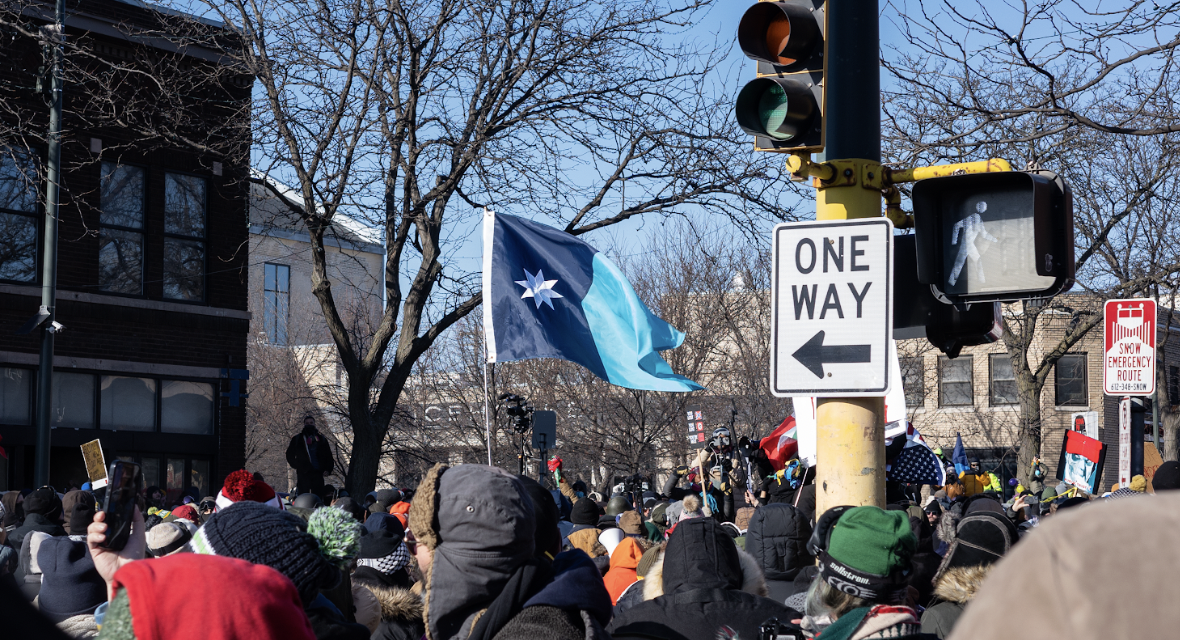"Punk rockers have some folks concerned at Hennepin-Lake" read a handwringing September 4, 1984, headline in the Star Tribune. Writes Bonnie Miller Rubin:
Passersby gawk with wonder. But area merchants glare with disfavor at the punk rockers, who they fear are scaring away business... The kids—who call themselves "McPunks"—say it is their appearance and not their behavior that is under attack. All they want, they say, is a place to catch up on gossip… to burn cigarettes, to see and be seen.
Those glaring merchants supplied some choice quotes to Rubin.
"I'm afraid to walk by," said Posh manager Robyn Sandberg, who did yield that some McPunks were "nice" but also "bored." "I won't eat there anymore because they've completely taken over—and their numbers give them power."
"You have some very respectable kids who are dressing the part and loving it, but some are just destructive," added John Meegan, owner of Top Shelf Tailors. "Part of it is the age-old conflict between one generation and another… But I'm only 30 and some of them make me nervous."
Critically, the story notes, the McPunks had "not been directly connected" to recent acts of vandalism in the Minneapolis neighborhood, though that didn't spare readers from the caterwauling of small-biz tyrants. Two City Council members planned to meet with the Police Captain to discuss the "punkers" problem, Rubin wrote.
In the Strib article's photo stood McPunk pals Kelly Williams, Ben Geffen, and Scott Fine, beaming beneath the glowing Golden Arches. It's as if they're in on the joke, already having outwitted their Uptown opposition by knowing, intrinsically as all kids do, that the Serious Adults in the room are more full of it than a beat cop after a Big Mac.
Over the weekend, our buds who run the Old Minneapolis Facebook group featured the photo of Williams, Geffen, and Fine, and they tagged yours truly; they thought our readers might be curious to know the whereabouts of the McPunks. Because Racket is all about reader service, I tracked down Geffen and Fine, both of whom were eager to chat about the halcyon days of cigs, mohawks, and outsider solidarity outside the Micky D's at 2929 Hennepin Ave. (Sadly, Williams died a few years ago, her two friends report.)
Here's Fine, who works as a freelance web developer, and Geffen, who works as general manager at the Parkway Theater, on life during the McPunk days.
How’d you become a McPunk?
Fine: Ya know, I just got a call from a friend in high school saying, “Do you wanna come hang around at McDonald’s in Uptown?” I said, “Why?” He said, well, a buncha punk-rock kids from all around the city meet up there and hangout these days. I thought, OK, well that sounds interesting. I think I called Ben, actually. Ben and I are still good friends. I called him, he grew up just a few blocks away from there on Lake & Colfax. We met up there, and right away it became our weekend thing.
Geffen: It was Scott. We were hanging out one day, it must have been ninth grade or so, and he was like, “I heard people are starting to hangout at the McDonald’s Uptown; we should go up there and see what’s going on.” I was a teenager looking for something to do, and it was a great social scene where you could just show up, and there would always be people you knew there.
What was it like being in the McPunk crew?
Fine: The same thing any group of teenagers did. We hung around and tried to impress one another. It’s funny that some of the local adults were so scared or worried about us, because I think we were pretty much up to good clean fun. I Imagine what we were doing was in some ways a lot less nefarious than what some of the football players and cheerleaders were up to. We were pretty good kids, for the most part. Ben and I weren’t tough guys by any means, but a lot of the kids who hung out there were tough kids. They weren't looking for a fight or anything. There was some teenage drinking, some pot smoking, some torrid teenage romance. For the most part… we didn’t like Bon Jovi, we didn't like Madonna, whatever mass culture was trying to offer us in the '80s. There was a lot more exciting stuff happening and, just, you wouldn’t hear a note of it on the radio. That music kinda bonded us. We all looked up to the people who were making it, so we wanted to dress like them. We liked that it shocked people. Teenagers love attention.
Geffen: First, I’ll say I never heard anyone in that crew say the term “McPunk.” That was something other people said. There were a lot of people there, maybe 50-100 people altogether that’d be there at one time or another. So it wasn’t just one group of people. It was a whole bunch of people from different schools, different parts of town. But everybody felt like this was a place where you could get together with people that felt like they were outside the mainstream, and there wasn’t a whole lot of opportunity for things like that back at that time. I would walk around town with a mohawk then, and I had to watch when someone yelled out their car to see if they would turn, because they were going to come around the block to beat me up. You were regularly assaulted for your haircut. It was safety in numbers, and high school kids wanna hangout with each other.
Any favorite funny or crazy memories from that era?
Fine: OK, here’s a story for you. What was it… the '84 Olympics? McDonald’s gave out these game pieces throughout the country, and the better the U.S. teams did the more free stuff you got for these game pieces. And of course the Soviets ended up boycotting those Olympics, so those game pieces… you could get a lot of free stuff, because the U.S. really swept those Olympics. Like a gold medal was a hamburger, a silver medal was fries, a bronze was Coke. Of course, some of the teenagers we knew worked at McDonalds, and would literally give us big garbage bags full of game pieces. So for that entire summer pretty much any of the McPunks ate whatever we wanted at McDonald’s, and there was really nothing they could do about it. We had the game pieces.
Geffen: Well, everybody had the payphone number for Snyder Drug, which was right by the McDonald's there. And it would ring, and people would call on it and be like, “Hey, is this person here?” It was the community McPunk phone line, more or less. It was fun to call.
Who were your favorite bands at the time?
Fine: It turned out to be a really important part of what happened in modern music, what was happening just here in Minneapolis. We’d go to see bands like Hüsker Dü and the Replacements, and just thought these guys are great. We didn’t realize not every city had bands that were that critical, making music that was that cutting edge. I think we all got turned onto the Dead Kennedys, Minor Threat, Fear, Black Flag, Circle Jerks… MDC was huge. And of course there’s the earlier stuff like the Ramones, the Clash, and the Sex Pistols. A lot of kids liked the British stuff like GBH and Discharge; that never really appealed to me, but Ben loved that stuff.
Geffen: I was into the punk hardcore scene. Always been a Clash fan, I liked a lot of what was happening in the D.C. scene with Minor Threat. Still love Black Flag. The list is pretty long.
Do you get nostalgic going past the ol’ McDonald’s?
Fine: I have all kinds of feelings. I continued to live in Uptown until not long ago, really. I lived there until I was 47, except for a few years in D.C. Obviously, anything changes a lot in 35 to 40 years. We’ve seen a lot of changes, I don’t know that we’ve seen any more or less than any other city neighborhood changes. Because of the way we looked, the police came down on us pretty hard. It was pretty silly. I think we witnessed some things, in terms of things we saw the MPD do and the way we saw them treat people, that probably not a lot of middle-class white kids did, besides us. That of course confirmed what we thought about authority in the first place.
Geffen: Not really. That’s the neighborhood I grew up in, so I’ve sorta seen it change for forever.
What’s your go-to order at McDonald’s?
Fine: I’m a vegetarian. [Pivoted to above story about the Olympics sweepstakes.]
Geffen: I’ve been a vegetarian since I was 13. [The Olympics sweepstakes windfall] just amounted to French fries and milkshakes for me.
Do the McPunks ever get together these days?
Fine: There’s no formal thing. There was never any. McPunks is what the newspaper called us, we didn’t call ourselves that. Any kind of formal organization, or even the sense that we had a joke crew… Ya know, I just had dinner with Ben last week. Those friendships really endured. It was mostly South High, Southwest High, and North High that fed that group, and some kids from Edina. We’re kind of like a high school class. We run into each other, we talk on Facebook. I still play music with some of the same guys I played music with then.
Two-part, very dorky question: What was the most punk-rock thing about you then? What’s the most punk-rock thing about you now?
Fine: Yeah, that’s a pretty dorky question. I don’t know… that means so many different things to so many different people. For my closest friends and I, we were really dorky kids; we didn’t fit in anywhere, and punk rock was a way we could be part of an instant club. The most punk-rock thing is community, and I continued to stay involved in the community as much as I can. The most punk-rock thing is to be involved with other people, and accepting and open. It’s a pretty defining thing. I joke about it, but it was a real counterculture movement. It was formative for all of us.
Geffen: I don’t have an answer for that, I’m sorry. What is punk rock? Everybody is still arguing about that.
We have to ask the eternal question: Is Uptown dead or is Uptown alive?
Fine: I don’t know. As long as there are people there, it’s not dead. It’s definitely going through a rough patch. Uptown is reflective of Minneapolis, which has stood out as a cultural spot in the U.S. among medium-sized cities for a long time. Something interesting will happen in south Minneapolis again, you can count on it. Definitely the kids will make it special.
Geffen: There’s a different group of people that goes there than when I went there, but it seems pretty active. I don’t really identify with it now, but it seems like some people do. It’s not super alive for me, but it appears to be for others.
